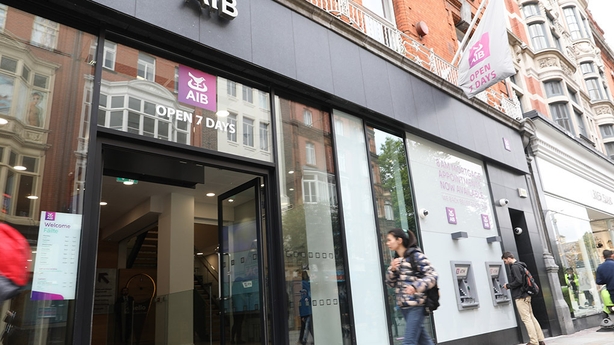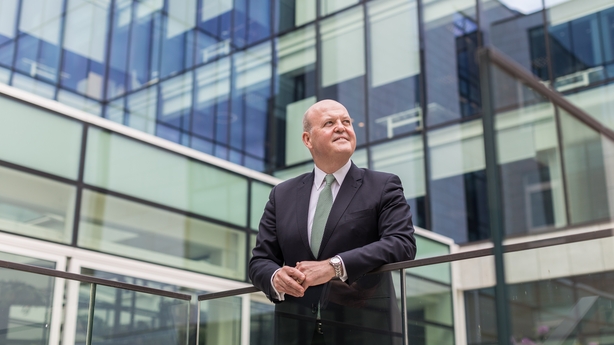AIB has today lifted its full-year income guidance after an increase in first-half profit and announced a €505m share buyback that will further cut the Government's stake in the bank.
AIB today reported an after tax profit of €1.108 billion, up from €854m the same time last year.
The bank said its net interest income (NII) - the key driver of bank profitability - was up 18% year on year at €2.1 billion.
The bank, which had a 36% share of the Irish mortgage market at the end of June, expects NII of about €4 billion this year, it said. The bank had previously forecast NII of more than €3.65 billion.
The raised guidance is because AIB now expects European Central Bank interest rates to stand at 3.25% at the end of 2024, up from a previous projection of 2.75%, as well as an improved asset growth outlook and a slower than expected shift by savers to longer-term products.
The bank said its total income for the six month period rose by 12% to €2.470 billion.
AIB said its gross loans of €68.9 billion increased by €1.9 billion or 3% mainly driven by strong new lending exceeding redemptions.
It said it now expect customer loans to grow by 4% this year which compares to previous guidance of 2%.
Total new lending increased by 13% to €6.3 billion with the bank noting positive trends across its new Climate Capital segment, personal lending and mortgages.
New mortgage lending in Ireland was up 10% to €1.9 billion, which reflected a mortgage market share of 36.4%.
Personal lending was up 10% to €0.7 billion, which the bank said was due to its enlarged customer base and an increase in consumer credit demand.
Meanwhile, new lending to SMEs in Ireland increased by 8% to €0.8 billion, while in its Capital Markets unit, new lending was up 5% to €1.9 billion.
The bank said its asset quality remains "resilient" and it continues to carefully manage the loan book, particularly in those sectors impacted by inflationary pressures and higher interest rates.

Its non-performing loans stood at €2.2 billion or 3.2% of gross loans by the end of June, compared to €2 billion or 3% of gross loans at the end of December 2023.
Operating costs at the bank rose by 6% to €947m, due to increased staff numbers to support higher business volumes, inflation and enhanced employee benefits.
It said it expect 2024 costs to increase by 6-7% as well as a €25m once-off spend for customer and operational efficiency initiatives including investment in its branch network.
Colin Hunt, AIB's chief executive, said the bank delivered a very "strong financial" performance with profit after tax of €1.1 billion in the first half of the year as it embeds its strategic priorities of enhancing its customer focus, further greening its business and driving greater operational efficiency.
"Given our strong capital position, we are pleased to announce our first post-GFC mid-year distribution, with discussions underway with the Department of Finance for a €500m directed share buyback, which would bring payments to the State to €3 billion so far this year," the CEO said.
We need your consent to load this rte-player contentWe use rte-player to manage extra content that can set cookies on your device and collect data about your activity. Please review their details and accept them to load the content.Manage Preferences
"Following a very strong first half and with momentum in our business we are well on track to support our 3.3 million customers, our communities and the wider economy while delivering attractive, sustainable returns for our shareholders," he added.
AIB's finance chief Donal Galvin said the share buyback, of which €500m will be a directed buyback from the Irish state, should cut the Government's stake to between 22% and 23%, down from 25.5%.

Speaking on Morning Ireland, CEO Colin Hunt said the bank entered 2024 with great momentum from last year.
He said the strong profits in the first six months were partly driven by the strength of the Irish economy.
"When the Irish economy does well, AIB is going to do well," he said.
Mr Hunt added that a more "normalised" interest rate environment also added to the profitability of the group.
"I do expect that as the interest rate cycle begins to turn down, we've already seen a reduction in interest rates from the ECB, that you will see the overall return on tangiable equity in the group moderate," he said.
Mr Hunt did not provide an answer when asked when AIB will pass on those June ECB rate reductions to customers on variable rates.
He said they continue to have an ongoing review in terms of pricing in the market.
On deposit rates, Mr Hunt described their offerings as "attractive" and said this is evidenced in the inflow of deposits in the first half of the year.
"We saw total inflows of about €2 billion in the first half of the year," he said.
Back in June, the State sold off another 5% stake in AIB, bringing its holding to just over 25%.
When asked how soon he would like to see the bank back to full private ownership, Mr Hunt said that is a matter for the Minister for Finance and the Government.
"My job and the job of my 10,000 colleagues across the group is to ensure that if and when the Government decides to reduce its share in AIB further, that there is a strong, sustainable investment proposition in the market - and I think that is what we are doing everyday," he stated.
AIB is still subject to a pay cap for senior executives of €500,000 a year. Minister for Finance Jack Chambers has indicated that is going to stay in place.
However, this morning Mr Hunt refused to share his views on the matter.
"I try to focus all of my energy on areas I can influence and all of my energy in my professional life is devoted to leading this organisation, and working with my 10,000 colleagues to deliver for our customers every day of the week," he said.
AIB's share purchase scheme taken in context of financial outlook
Questioned on the mid-year share buyback, CEO Colin Hunt told an analyst call this morning that it was the intention of the bank's executive team to return to a "normal cadence" of distributions and dividends ahead.
He said the bank had a strong track record of getting regulatory approval for distributions outside of its normal dividend policy.
CFO Donal Galvin said the decision on the size of the share purchase was taken in the context of the financial outlook.
"We knew we were going to be in a strong position so our questions were about what was the most effective thing to do next," he said.
"We are very focused on ensuring that we can help the Government maintain their goals of reducing their shareholding in AIB, which is obviously always going to be dependent on our financial performance," he said.
On the mortgage market, Mr Hunt said there had been a noticeable flow of customers back onto variable rate mortgage products from predominantly fixed rates as they survey the lending environment as the European Central Bank starts to trim interest rates.
He said the bank had considerable success in attracting mortgage customers.
"One of the big advantages here is that we haven't hung our hat on one product," he said.
"We're competitive on variable, we're competitive on fixed rates," he added.
Colin Hunt said the bank's share of the mortgage market had grown to an average year to date figure of 36.4% from 33% in 2023.
"In the month of June alone, our mortgage market share in terms of drawdowns was 37.3%," he noted.
He said this was being achieved against the backdrop of enhanced competition in the market.
Although there are three dominant market players in the main pillar banks, Mr Hunt pointed out that there were now 10 operators in the mortgage space here.
Mr Galvin said customer volumes were not expected to "grow materially from here".
The bank grew its customer base from 2.7 million in 2020 to more than 3.3 million customers now.
"They will grow at a normalised rate, but the challenge for us is now going to be, with all of these customers, is there an additional produce that we will be able to offer," he said.
Mr Hunt said the bank had deployed the use of Artificial Intelligence in the areas of cyber defence, fraud defence, customer experience and driving "enhanced efficiency" in operations and "stripping out even more manual processes."
Shares in the bank were lower in Dublin trade today.

